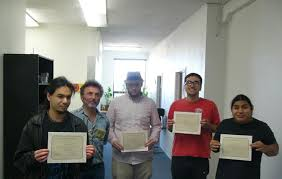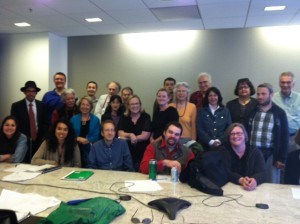In the workforce field, as in other fields, most start-ups will need to pivot several times to survive. So it is with our Bay Area Autism Job Club.
The Autism Job Club is a project of AASCEND (Autism, Asperger Syndrome Coalition for Education, Networking and Development), the volunteer Bay Area group for adults on the autistic spectrum. We have undertaken three employment strategies since 2011, and each strategy has changed course at least one time.
1. Workforce strategy 1, The Autism Employment Network: The Autism Employment Network is to draw on family, relatives, friends and neighbors of people with autism, to identify job openings and assist in retention. We have found slow going in building such a Network—jobs are scarce, everyone is deluged with employment requests, most of all it is highly labor intensive to contact potential Network members, and we are all volunteers.
 Pivoting, we have turned recently to the internet to build an online employment network. Brian Jacobs, principal at Emergence Capital and AASCEND board member, earlier this September started a LinkedIn group, Spectrum Employment Community by AASCEND (referring to persons on the autistic spectrum). For this LinkedIn group, Jacobs has set three goals: (i) “to match employers and workers”, (ii) to “educate employers about the advantages of employing workers from all parts of the autism spectrum,” and (iii) “to share information and practical solutions for our community members.”
Pivoting, we have turned recently to the internet to build an online employment network. Brian Jacobs, principal at Emergence Capital and AASCEND board member, earlier this September started a LinkedIn group, Spectrum Employment Community by AASCEND (referring to persons on the autistic spectrum). For this LinkedIn group, Jacobs has set three goals: (i) “to match employers and workers”, (ii) to “educate employers about the advantages of employing workers from all parts of the autism spectrum,” and (iii) “to share information and practical solutions for our community members.”
Jacobs is seeking to leverage the reach of LinkedIn and the internet to expand the employment network beyond what could be built through traditional employment network outreach. He has his first 20 or so members. The internet allows for geometric growth in network memberships. However, Jacobs recognizes that extensive outreach, regular new board activity, and the active participation of many members will be needed, to avoid the fate of the great majority of online job networks that never advance beyond a few tens of members.
2. Workforce Strategy 2, The Autism Employment Training Venture: Conventional wisdom is that persons on the autistic spectrum possess unusual skills for software testing. In truth such skills probably are held by a small segment of persons on the spectrum. However, the perception of unusual skills has led to a number of high profile business ventures to directly employ persons on the spectrum in software testing.
The viability of these businesses remains in doubt. Specialisterne, the best-known of these businesses, started in Denmark in 2004, has grown to a reported 50 employees in 2011, though its growth has been fueled by the generous employment subsidies through the central Danish government. Aspiritech in Illinois is struggling, and Semperical, in the Silicon Valley, has delayed its start as it restructures its business plan.
 In contrast, a modest venture in software testing, The Specialist Guild, by two AASCEND members, Luby and Andy Aczel, has actually shown results, though it too is continuing to adapt to survive. Specialist Guild has trained eight adults on the spectrum as software testers, and currently has two of these testers working at Salesforce.com. It has generated a small amount of paid contract work in software testing with private firms. Its current pivot is to link its training expertise with Semperical’s technology marketing in the Silicon Valley, to achieve the necessary volume of contract work for the trainees.
In contrast, a modest venture in software testing, The Specialist Guild, by two AASCEND members, Luby and Andy Aczel, has actually shown results, though it too is continuing to adapt to survive. Specialist Guild has trained eight adults on the spectrum as software testers, and currently has two of these testers working at Salesforce.com. It has generated a small amount of paid contract work in software testing with private firms. Its current pivot is to link its training expertise with Semperical’s technology marketing in the Silicon Valley, to achieve the necessary volume of contract work for the trainees.
3. Workforce Strategy 3, The Job Club: The Job Club itself, an effort of job search skill mastery and mutual support among persons on the spectrum, is starting its third cycle on September 28. Ms. Cindy Zoeller continues as the Job Club leader, and the Club continues to meet bi-monthly on Saturdays in downtown San Francisco at the ARC building.
The Club remains open to all adults on the spectrum. However, it has evolved from its loose, drop-in structure to adopt a three-month curriculum and structured feed-back loop between Ms. Zoeller, the volunteer counselors and the participants.
 Adapting, evolving, and pivoting: these skills usually are associated with private sector start-ups. They are just as applicable to start-ups in the workforce world today, whether placing persons on the autistic spectrum or other workers.
Adapting, evolving, and pivoting: these skills usually are associated with private sector start-ups. They are just as applicable to start-ups in the workforce world today, whether placing persons on the autistic spectrum or other workers.

